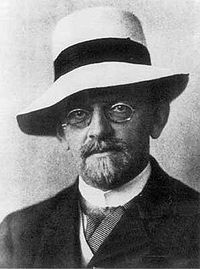<Back to Index>
- Mathematician David Hilbert, 1862
- Architect Auguste de Montferrand, 1786
- Queen of Sweden Ulrika Eleonora, 1688

David Hilbert (January 23, 1862 – February 14, 1943) was a German mathematician, recognized as one of the most influential and universal mathematicians of the 19th and early 20th centuries. He discovered and developed a broad range of fundamental ideas in many areas, including invariant theory and the axiomatization of geometry. He also formulated the theory of Hilbert spaces, one of the foundations of functional analysis. He is also known as one of the founders of proof theory, mathematical logic and the distinction between mathematics and metamathematics.
Hilbert, the first of two children and only son of Otto and Maria Therese (Erdtmann) Hilbert, was born in either Königsberg (according to Hilbert's own statement) or in Wehlau (today Znamensk, Kaliningrad Oblast)) near Königsberg. In the fall of 1872, he entered the Friedrichskolleg Gymnasium. In 1879 he transferred and, later, graduated from (spring 1880) the more science-oriented Wilhelm Gymnasium. Upon graduation he enrolled (autumn 1880) at the University of Königsberg, the "Albertina". In the spring of 1882, Hermann Minkowski returned to Königsberg from Berlin and entered the university. In 1884, Adolf Hurwitz arrived to Göttingen as an Extraordinarius, i.e., an associate professor. Hilbert obtained his doctorate in 1885, with a dissertation, written under Ferdinand von Lindemann, titled Über invariante Eigenschaften spezieller binärer Formen, insbesondere der Kugelfunktionen ("On the invariant properties of special binary forms, in particular the spherical harmonic functions").
Hilbert remained at the University of Königsberg as a professor from 1886 to 1895. In 1892, Hilbert married Käthe Jerosch (1864–1945), "the daughter of a Konigsberg merchant, an outspoken young lady with an independence of mind that matched his own". While at Königsberg they had their one child Franz Hilbert (1893–1969). In 1895, as a result of intervention on his behalf by Felix Klein he obtained the position of Chairman of Mathematics at the University of Göttingen, at that time the best research center for mathematics in the world and where he remained for the rest of his life.
Among the students of Hilbert were: Hermann Weyl, the champion of chess Emanuel Lasker, Ernst Zermelo, and Carl Gustav Hempel. John von Neumann was his assistant. At the University of Göttingen, Hilbert was surrounded by a social circle of some of the most important mathematicians of the 20th century, such as Emmy Noether and Alonzo Church. Among his 69 Ph.D. students in Göttingen were many who later became famous mathematicians, including (with date of thesis): Otto Blumenthal (1898), Felix Bernstein (1901), Hermann Weyl (1908), Richard Courant (1910), Erich Hecke (1910), Hugo Steinhaus (1911), Wilhelm Ackermann (1925). Between 1902 and 1939 Hilbert was editor of theMathematische Annalen, the leading mathematical journal of the time.
Good—he did not have enough imagination to become a mathematician.—Hilbert's response upon hearing that one of his students had dropped out to study poetry.
Hilbert lived to see the Nazis purge many of the prominent faculty members at University of Göttingen, in 1933. Among those forced out were Hermann Weyl, who had taken Hilbert's chair when he retired in 1930, Emmy Noether and Edmund Landau. One of those who had to leave Germany was Paul Bernays, Hilbert's collaborator in mathematical logic, and co-author with him of the important book Grundlagen der Mathematik (which eventually appeared in two volumes, in 1934 and 1939). This was a sequel to the Hilbert-Ackermann book Principles of Mathematical Logic from 1928.
About a year later, he attended a banquet, and was seated next to the new Minister of Education, Bernhard Rust. Rust asked, "How is mathematics in Göttingen now that it has been freed of the Jewish influence?" Hilbert replied, "Mathematics in Göttingen? There is really none any more."
By the time Hilbert died in 1943, the Nazis had nearly completely restructured the university, many of the former faculty being either Jewish or married to Jews. Hilbert's funeral was attended by fewer than a dozen people, only two of whom were fellow academics, among them Arnold Sommerfeld, a theoretical physicist and also a native of Königsberg. News of his death only became known to the wider world six months after he had died.
On his tombstone, at Göttingen, one can read his epitaph, the famous lines he had spoken at the end of his retirement address to the Society of German Scientists and Physicians in the fall of 1930:
- Wir müssen wissen.
- Wir werden wissen.
As translated into English the inscriptions read:
- We must know.
- We will know.
The day before Hilbert pronounced this phrase at the 1930 annual meeting of the Society of German Scientists and Physicians, Kurt Gödel—in a roundtable discussion during the Conference on Epistemology held jointly with the Society meetings—tentatively announced the first expression of his incompleteness theorem, the news of which would make Hilbert "somewhat angry".